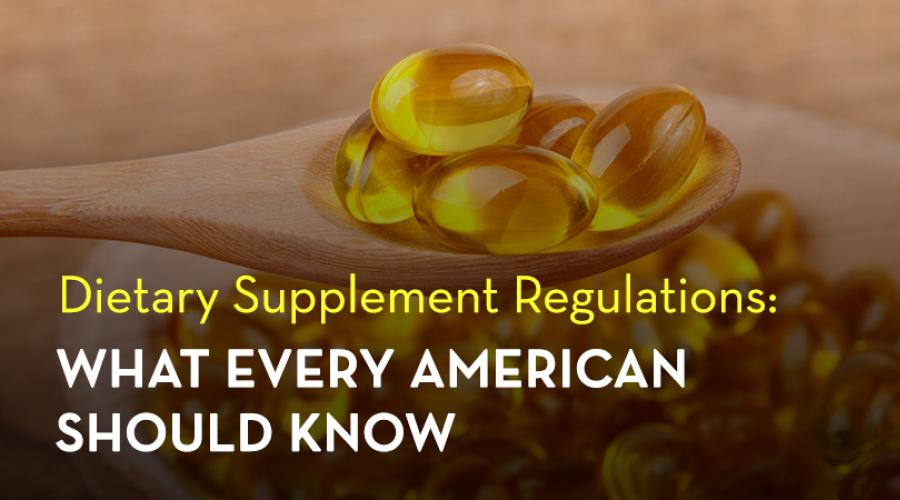
Dietary supplement products and the ingredients they contain are subject to strict and detailed regulations.
Many people are surprised to learn that dietary supplement products and the ingredients they contain are subject to strict and detailed regulations. These rules help protect the millions of Americans who take a dietary supplement such as Ubiquinol CoQ10.
This article gives an easy-to-understand overview of the federal laws that U.S. dietary supplement companies must follow, along with new ways that manufacturers are further improving the integrity of these healthful products.
Dietary Supplements: A Unique Niche with Unique Rules
Dietary supplements live in the middle ground between food and drugs, sharing aspects of both categories. This special niche requires its own specific set of government regulations that cover safety, manufacturing, quality control, labeling and advertising.
Because they are considered a subset of foods, the U.S. Food and Drug Administration (FDA) is responsible for enforcing the legal requirements that apply to dietary supplements and their individual ingredients.
Dietary supplement companies are required, by law, to make sure their products are safe and accurately labeled.
Many of those requirements are in the Dietary Supplement Health and Education Act of 1994 (DSHEA), which amended the Federal Food, Drug, and Cosmetic Act (FDCA) to:
- Create a legal definition of a “dietary supplement”;
- Prohibit manufacturers and distributors from marketing products that are contaminated or misbranded; and
- Define the types of benefit claims that can be made on product labeling.
When an ingredient will be sold that’s new in the marketplace (and it’s not already found in the food supply), DSHEA also requires manufacturers to submit a New Dietary Ingredient notification and safety data to the FDA.
Dietary supplement companies are required, by law, to make sure their products are safe and accurately labeled. They must also be compliant with all applicable provisions in the FDCA.
FDA’s Authority over Dietary Supplements
The FDA has the authority to take action against any marketed dietary supplement that:
- Is toxic or unsanitary;
- Poses a significant or unreasonable risk of illness or injury;
- Fails to meet manufacturing and safety standards;
- Makes false or unsubstantiated claims on its product labels; or
- Claims to diagnose, treat, cure or prevent a disease.
The Department of Justice can get involved if criminal conduct is suspected.
The FDA also has the authority to implement regulations covering current Good Manufacturing Practices (GMPs) for dietary supplements. Finalized in 2007, these rules require supplement products be manufactured to:
- Meet specific quality standards;
- Ensure their identity, purity, strength and composition;
- Be free from contamination; and
- Ensure that a supplement includes what is claimed on the product’s label.
Dietary Supplements and Food Safety Rules
Because they are considered a subset of foods, dietary supplements must also be made in compliance with federal food safety regulations. That means dietary supplement manufacturers and ingredient suppliers are bound by the FDCA and the Food Safety Modernization Act (FSMA).
Signed into law in 2011, FSMA significantly changed federal law to focus on not just reacting to but actually preventing food safety problems such as contamination. The Act, among other things, added new requirements for processes, monitoring and analysis meant to help prevent safety problems from happening.
More Resources for FDA Oversight of Supplements
In late 2015, the FDA elevated its Division of Dietary Supplements into an Office of Dietary Supplement Programs. A growing dietary supplement industry, more recent amendments to the FDCA and increased FDA enforcement of the industry prompted this change.
The action is more significant than it may sound. Being designated an Office should give this FDA group more resources and capabilities to carry out the agency’s important functions.
FTC Advertising Laws and Dietary Supplements
The U.S. Federal Trade Commission (FTC) exists to “protect consumers by stopping unfair, deceptive or fraudulent practices in the marketplace,” and it has the primary authority to regulate claims used in advertising.
Supplement product advertising must be truthful and not misleading, and advertisers must have adequate substantiation for the objective claims they make.
Like all consumer packaged goods, dietary supplement companies must follow FTC rules. For example, supplement product advertising must be truthful and not misleading, and advertisers must have adequate substantiation for the objective claims they make.
The FTC is permitted to:
- Investigate, challenge and stop advertising that is false, misleading or not adequately substantiated;
- Negotiate consent orders that restrict how a company or individual may advertise a product to the public; and
- Enforce laws that prohibit "unfair or deceptive acts or practices."
FTC and FDA work together to investigate and enforce these rules. The purpose of their collective work is to see that dietary supplements are not just safe but also truthfully advertised to the public.
Industry Takes Steps to Preserve Integrity
Federal laws and government oversight are important tools in protecting the millions of Americans who consume dietary supplements every day. But industry trade groups and reputable supplement companies also take steps to uphold and improve product integrity.
Industry trade groups and reputable supplement companies are taking steps to uphold product integrity.
The Natural Product Association’s TruLabel registration database is just one example. Established 25 years ago, the TruLabel database currently catalogs more than 47,000 product labels, and inspired a similar effort by the National Institutes of Health (NIH).
Earlier this year, the Council for Responsible Nutrition (CRN) took the TruLabel and NIH databases several steps forward by authorizing the creation of an industry-wide dietary supplement product registry. The initiative will help regulators and retailers identify legitimate dietary supplement companies and products.
CRN, the industry’s leading trade association, has said this is just one of many steps its members are taking to support an even stronger and more accountable dietary supplement industry.












